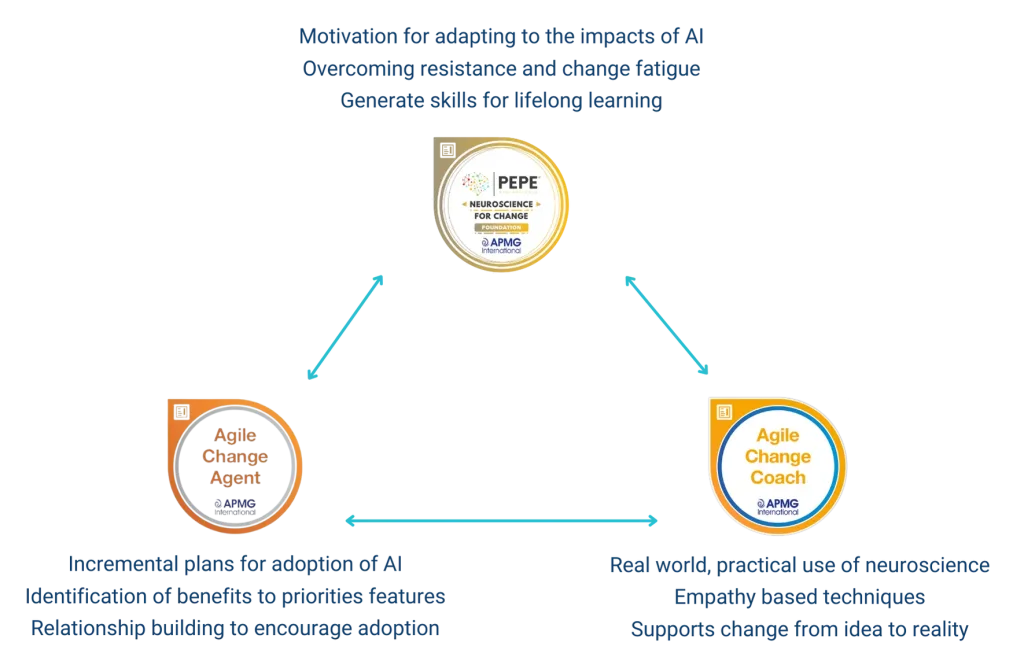Using AI for Change Management: Impact, Resistance and Human Interaction
Written by Melanie Franklin
AI is everywhere and is affecting every job role in a variety of industries. Change Management is no different. In this insight we’ll take a closer look at using AI for Change Management – particularly the impact it is having and the trends in change resistance. If you would like a deeper dive into AI and Change Management, download my White Paper.
The Impact of AI on Change Management – Information Analysis
AI can consume and produce content within seconds. It can scour the internet and a plethora of resources, then digest and reword that information for the consumer to understand. This is far more convenient for us than reading and understanding all that information ourselves and something that everyone is utilising. It’s quite amazing how quickly you can get a comprehensive answer to a query.
However, there is a consideration about how this could lead to analysis paralysis because there are so many different scenarios that AI can put forward about the impact of a change. Sifting through the reality of that can be very challenging.
On the positive side, AI’s ability to process huge volumes of sentiment-driven information is incredibly exciting and can be very helpful. For example, the experience of creating transcripts in any meeting these days—not needing a recording of watching people on screen, but having the transcript to put through copilot or any other tool to analyse the overarching sentiment of meetings – is transformative.
There are so many ways that AI is affecting information analysis and decision making. If you want to find out more – why not take a look at my AI Master Class.
The Impact of AI on Skills Transformation in Change Management
AI is also changing the way we view skills, training and information. Partly because AI can help us achieve many skills and complete tasks without the need for training. And partly because we don’t need to retain the information in our own brains any more, as AI can answer the questions for us.
AI on Hiring
AI is going to change what we ask for of people. It rebalances the skills we’re hiring for because curiosity tops the chart. Imagination about the future and vision is critical. Understanding where we’re trying to get to, is essential.
AI on Lifelong Learning
We cannot prepare people for individual changes related to AI because there are so many changes coming up. If you own a business or manage a team, then you should be looking to act now to help employees upskill and keep on top of AI in your sector. Attending webinars and seeking out learning opportunities demonstrates that you have lifelong learning skills – something we’re looking for far more than we have before. Take a look at some of the AI events I’m running here.
Change Resistance in the AI Era
When it comes to implementing change, there is always going to be resistance. AI has also had an impact on this; the resistance comes from a different place.
Traditional Change Fatigue
Change fatigue is growing. People aren’t going out of their way to resist change, but it is a feeling that’s building up in large part because of the continued volume of change that just does not stop. With my Change Management courses, we learn about resistance to change and I give you practical frameworks to minimise this resistance.
AI and the New Flavour of Resistance
AI can’t be blamed for change fatigue, but it has given it a different flavour. Resistance to change now, particularly for AI initiatives, is born out of fear – a significant fear that AI will take people’s jobs. If you are implementing AI into your day to day job roles and encouraging your team to utilise it more, it’s important to consider how the people you manage are feeling. If they are worried about it taking their job then resistance will only be natural.
The Neuroscience Behind AI Resistance
With AI in the workplace people detect that there is huge uncertainty, which is driving more resistance to change because our human brains do not vote for chaos and uncertainty – that is risky. Our brains are there to ensure our continued survival, so we don’t put ourselves in danger unnecessarily. That is also holding people back.
While change professionals are used to dealing with resistance to change and change fatigue in all change initiatives, this feels more deep-seated and therefore harder to address. This is why getting an understanding of Neuroscience is an important for any manager or leader.
Human vs AI in Change Management
We won’t get rid of human beings, particularly in the change arena where encouragement, feeling heard, feeling supported, feeling respected, and feeling valued are essential. Change management is about creating positive feelings for people.
It takes a human to empathise with how somebody is feeling. While you could analyse this with sentiment analysis through AI, a human can take that further and empathise – truly recognise as another human being how that feels.
The Impact of AI on Change Management
Based on everything discussed above and everything I have learned through Change Management and AI, your value as a change professional isn’t diminished by AI – it’s amplified. While AI handles the technical execution, you become more critical than ever in helping humans navigate, adapt to, and thrive in this new reality.
However, to ensure you stay critical, continuous training and development is crucial. I have several avenues for training and development that can help you keep up-to-date. One of which is my ChangeabilityPro®️ online change management training and development.
Recommended Learning Path
If you want to know more about AI and change management, I have three courses that fit together particularly well:

- Neuroscience for Change Course – Provides techniques for the motivation for adapting to the impacts of AI and techniques for overcoming resistance and change fatigue. Crucially, it shows how we can create an environment that generates skills for lifelong learning.
- Agile Change Agent Course – Focuses on planning and benefits identification and the relationship building that encourages adoption of change. This agile approach makes perfect sense for the level of uncertainty that AI brings, as things are moving so fast. Planning changes incrementally and iteratively, delivering something as soon as you can while you have certainty, then building on it and taking into account how things have changed.
- Agile Change Coach Course – Provides real-world practical application of neuroscience, empathy-based techniques where we take into account how the brain works and how people will be feeling and why they’re impacted the way they are. These techniques enable us to support change from idea to reality.
AI for Change Management and Beyond
The intersection of AI and change management requires a fundamental shift in how we approach both technology implementation and human adaptation. By focusing on uniquely human skills – curiosity, empathy, vision-setting, and contextual understanding – change professionals can not only survive but thrive in an AI-transformed world. The key is building the motivation, willingness, and resilience for lifelong learning while maintaining the human intelligence necessary to guide AI implementations successfully.
For more information and to discuss your learning journey, contact me today.

